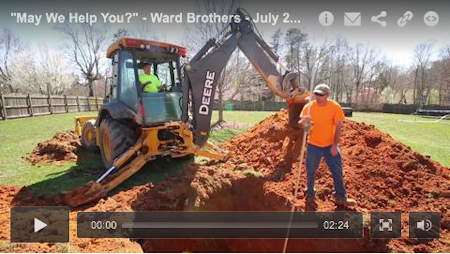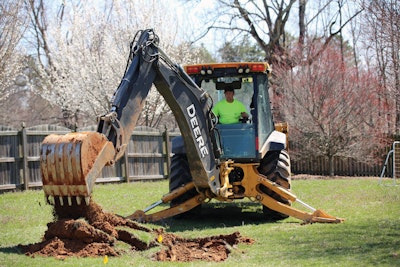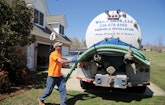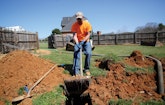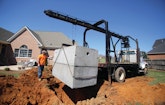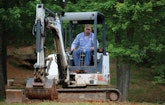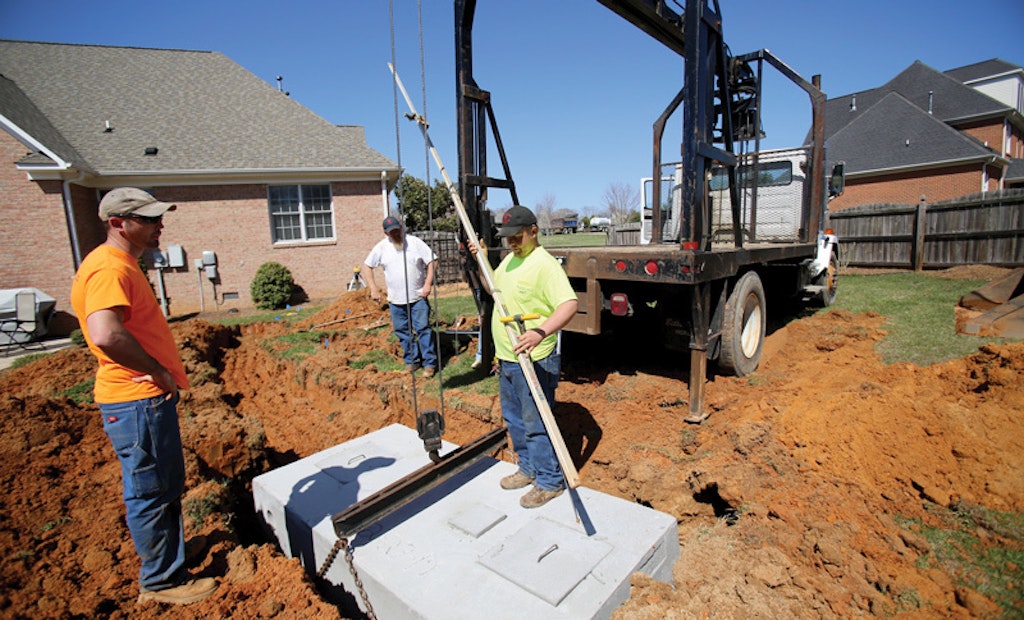
Interested in Excavating?
Get Excavating articles, news and videos right in your inbox! Sign up now.
Excavating + Get AlertsA can-do attitude and maintaining flexibility to provide value-added customer service have sustained Ward Brothers LLC through many economic ups and downs. Family company owners Nick and Nathan Ward oversee an experienced, cross-trained crew that has installed septic systems around Greensboro, N.C., for 40 years.
For the most part, Ward Brothers installs traditional septic systems … but don’t make the mistake of thinking it ignores advanced technology. Quite the contrary; the old-line contractor is always willing to try new things. If it’s in the ground Ward Brothers will maintain it, and that includes systems that use drip irrigation and LPP. The company also does commercial systems.
North Carolina is blessed with good soil structure, which means customers can often rely on the tried and true. That makes for predictably well-functioning septic systems in most cases.
“We see a few engineered systems. In our area of North Carolina we have a lot of good soils,” Nick Ward says. “We have so much good soil that unless people have a lake lot, which is harder to find and obviously environmentally sensitive, it’s easier and cheaper for buyers to find a piece of property that can accept a conventional septic system.”
A FAMILY BUSINESS
Ward and his brother Nathan took full control of the company two years ago. Their father Jimmie and uncle Ray started the company by providing system installs. In the 1970s, they expanded into pumping with equipment that would slide on and off a trailer. They poured their own tanks for a while, too, but in the early 1980s sold off all the forms.
Like many others in the industry, this newest generation of Ward brothers started early. “I was on the tractors when I was about 4. I was on the payroll when I was 11. I started learning the business about 12 years ago and managed it for about the last 10 years,” says Ward, now 35. He and Nathan, 31, split the management workload. Nick handles sales and scheduling, but both of them try to supervise the installation crews. Occasionally they will work on a big job together, but most of the time they work separately.
The company’s workforce is quite stable, Ward says. Equipment operators are dedicated to their jobs, but everyone else has a CDL and does whatever job needs doing. Most have reached the level where they can work independently.
The vacuum service truck is not on the road full time, however. It’s a job for rainy days, yet pumping has paid off. “We get a lot of repairs from pumping, meaning people who have failing systems and call us because we have maintained their tanks,” Ward says. The company seems to have picked up business from people who have seen its trucks rolling down the road, and many word-of-mouth referrals come to the mature company, he says.
North Carolina does not require pumping at regular intervals. Permits only recommend tanks be pumped every three years, but homeowners have been realizing they cannot ignore their onsite systems.
“In the last five to 10 years, we’ve done a lot more maintenance pumping. It used to be customers would call only when it was coming up in the yard or backing up in the house. We still get a lot of those,” Ward says. In the past, 75 to 80 percent of people ignored septic systems, but that figure made a modest improvement to 60 to 70 percent, in the Wards’ estimation.
“I think the real estate market has had something to do with that. Housing is up drastically in price. When you start putting $400,000 or $500,000 into a house, you start paying attention,” Ward says.
EQUIPMENT CORNER
Ward Brothers likes to use equipment for a long time. For pumping, the company relies on a 1991 Peterbilt with a 3,600-gallon steel tank and Masport pump, and a 1987 Mack with a 2,500-gallon steel tank and an A-C (ITT Goulds Pumps) pump. The Wards built out these trucks.
There are three dump trucks: a 1986 Peterbilt tandem with a Godwin body, a 1985 Peterbilt tri-axle and a 2005 Sterling tri-axle with an Ox body. A 1981 International Road Tractor pulls a dump trailer and a Ferree lowboy. Two 1999 Dodges, a 3500 and a 2500, a 1994 Dodge 2500, and a 1995 International service truck round out the fleet.
In addition there are two John Deere backhoes, a 2012 and a 1997, a 2000 model 864 Bobcat, a 2004 T300 Bobcat, a 2008 T190 Bobcat, and a 2013 T630 skid-steer.
While some contractors trade their trucks every four to five years to avoid costly repairs and the more costly downtime, the Wards have a different philosophy.
“We have fairly new equipment to my way of thinking,” Ward says. He and his guys do their own maintenance work during the winter. That includes rebuilding engines when necessary. A couple of his trucks are closing in on 1 million miles. One truck is past that, but it was a long-haul tractor before Ward Brothers picked it up, so it already had 1.2 million miles at the time of purchase.
“We do and don’t have time for maintenance,” Ward says. What needs to be done is done, yet the company is getting busier as the economy strengthens. Equipment is gradually being updated, yet the key to staying ready for the next job is to keep what you have well-maintained, he says.
STAY FLEXIBLE FOR SUCCESS
For Ward Brothers, a technician’s workday could include a simple backyard drainfield replacement or a large-scale $200,000 system for a school. Most engineered systems are for commercial operations. The business split is about 20 to 25 percent commercial and 75 to 80 percent residential. The mix hasn’t changed over the years.
In 2009, for example, they installed a 110,000 gpd system for the research and development arm of a company that made peat pots for garden stores. There were more than 20 different tanks and pumps to collect water from the plant, clean it, and then put it back into the plant. That was only a temporary facility, and Ward Brothers had more work in 2011 when it took the system out.
For the last several years, trucking aggregate and sand has been a growing service. “I try to do a lot of hauling because we have several dump trucks and drivers, and we can do that work by ourselves,” Ward says. “A lot of contractors use us to haul, and we’re trying to build that business more.”
Ward has discovered the company can be useful to septic system install customers who need additional work done. Perhaps the homeowners need a couple of tons of rock for their driveway. And commercial builders often want Ward Brothers to perform site prep and restoration, as well as final grading and seeding.
Ward tries to make a project turnkey for the owner. He will subcontract the plumber and the electrician for the wastewater system, landscape the yard, and subcontract the fencing company. “I saw a niche there, especially for landscaping,” Ward says. He thought about the types of calls he received from customers. “I got a lot of call-backs from people who were not happy with their yards settling and from people who didn’t know who to call about installing a fence.”
Ward estimates the company landscapes about half of the yards for its residential onsite customers. He now includes the service on the project estimate and marks it as optional. Even when homeowners don’t opt for that line item initially, they remember the service and call if they are unhappy with their chosen landscape contractor.
CUSTOMER SATISFACTION
Ward doesn’t have a long-range business plan. He just wants to help contractors and homeowners make the best decisions about the services and systems they need. He is considering dedicating a technician to septic pumping full-time. Ward says there is a lot of competition for the pumping service, but he concentrates on good service over being a low-cost provider.
“I have a lot of people who call me and don’t care what I charge them because they know it will be a fair price,” he says.
Success comes down to relationships for this family installing business. Ward wants to strengthen relationships with customers and other area contractors he can utilize when needed. For example, he calls a plumber he knows is dependable, and he will recommend that plumber to others. He realizes it’s smart to build a network of goodwill among wastewater professionals … and that attitude is good for his customers. It all comes back to helping customers solve their problems efficiently and reasonably.
At 19, Ward was bossing a crew. Over the dozen years since he has grown up, he’s discovered the key to a good business:
“Customers are important, and you have to take care of them,” he says.
